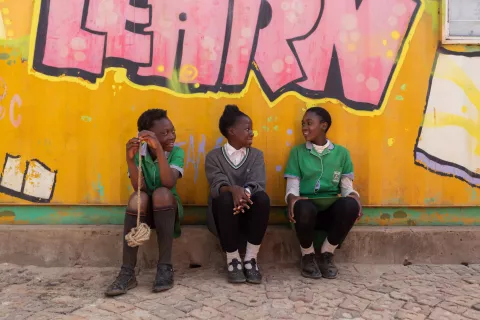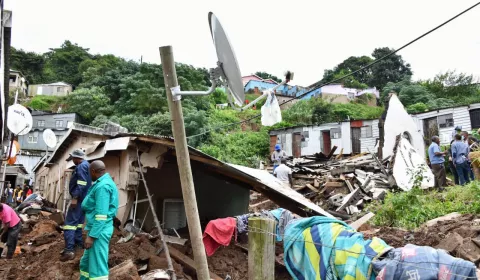8 per cent of households in South Africa possess all 22 perceived necessities for a decent standard of living
Latest ‘Decent Standard of Living’ report launched today highlights how multiple non-income dimensions of poverty impact people’s lives.

PRETORIA, South Africa, 17 August 2023 – Just over a quarter of households surveyed report having almost all the desired possessions, or perceived necessities, for a dignified life, according to the latest ‘Decent Standard of Living: Findings on possession of the social perceived necessities in 2022’ report.
The report focuses on how non-income dimensions of poverty, known as socially perceived necessities (SPNs), impact people’s lives according to three categories: social networks, such as someone to look after you if you are ill; commodities that are bought, such as a fridge; and the social wage, services provided by the State, such as mains electricity.
The report was produced by the Social Policy Initiative, the Southern African Social Policy Research Institute, and the Labour Research Service, in collaboration with UNICEF South Africa, the Department of Social Development and Wits University Chair of Social Security.
Speaking at the launch in Pretoria, Isobel Frye, Executive Director of the Social Policy Initiative, said, “Inclusive methods to measure well-being and deprivation in South Africa, the most unequal country in the world, are essential. To guarantee a prosperous life for all, where not only the elite thrive, we must better understand these deprivations so policies can be adopted now to improve daily lives, as promised in the Constitution and international human rights treaties.”
The report notes that the percentage of people possessing each of 22 SPNs is higher today than it was in 2015, a positive finding about improvements in living standards, while the cost of acquiring all SPNs dropped from R8,327 per capita per month in 2018 to R6,034 today.
From a child perspective, having somewhere for children to play safely outside the house, which is listed as a SPN, increased from 36.5 per cent in 2015 to 50.4 per cent in 2022. But fewer respondents were able to always have an adult at home to look after a child under ten years and fewer could afford complete school uniform for children without hardship, just over 65 per cent in 2022, compared to nearly 84 per cent eight years earlier.
“These findings provide the important nuances needed to better understand how lives, including children’s, are impacted by poverty that is not only defined by income,” said Aleta Miller, UN Women Representative in South Africa Multi Country Office. “This work goes to the heart of the United Nations Sustainable Development Goals on poverty reduction, and importantly, responds directly to UN recommendations for South Africa to develop an adequate standard of living measure,” added Miller.
A cellphone, mains electricity in the house and a fridge are the top three SPNs possessed by those surveyed. But some SPNs, such as police on the streets and a neighborhood without rubbish, are possessed only when 18 of the 22 SPNs are also held. Being able to afford prescribed medicines and having regular savings for emergencies are amongst the least possessed.
The mean household size for the group who possess all 22 SPNs is 3.7 people, and 61 per cent of this group have children in the household. For those with 10 SPNs or fewer, the mean household size is larger at 5.2 people and 80 per cent of this group have children in the household.
“The SPN approach provides important details on the deprivations impacting people’s lives but going forward we want to spend a lot more time understanding the data with a specific focus on the well-being of women and children in South Africa,” said Isobel Frye.
The report findings also reflect the inequalities that exist across society. Some 89 per cent of the group possessing all 22 SPNs are urban dwellers, predominantly in Gauteng and the Western Cape provinces, while 80 per cent of the group with fewer than 10 SPNs live in rural areas. Although 57 per cent of those with 22 SPNs are black Africans, this is only 6 per cent of all the black Africans surveyed.
UNICEF South Africa, UN Women and the UN in South Africa advocate for a comprehensive social protection system that improves living standards for every child, for everyone, irrespective of race, gender, or location.
Notes to editors:
The report is the latest in a long-standing collaboration between the Social Policy Initiative, the Southern African Social Policy Research Institute, and the Labour Research Service. Support for this work comes from UNICEF South Africa, as well as the Department of Social Development and Wits University Chair of Social Security.
The methodology applied in this work is groundbreaking for its combination of participatory qualitative work and the use of survey data to understand what is required for a decent standard of living and then to measure how many people possess that standard.
Media contacts
Additional resources
About UNICEF
UNICEF works in some of the world’s toughest places, to reach the world’s most disadvantaged children. Across more than 190 countries and territories, we work for every child, everywhere, to build a better world for everyone.
Follow UNICEF South Africa on Twitter, Facebook, Instagram, YouTube and LinkedIn




